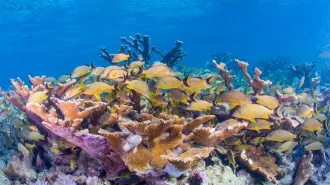Bacteria are more likely to exchange genetic information with their neighbors than with their relatives, a new study shows.
Researchers also found that bacteria living in and on humans are more likely to swap genes than are bacteria that live in soil, oceans or other environments. Exceptions to the neighborhood-only swap-meet rule are genes that confer an evolutionary advantage, such as the ones that make bacteria resistant to antibiotics.
Unlike animals, which can share genes only within species, bacteria readily exchange bits of DNA with other kinds of microbes. Previous evidence had indicated that gene swapping (which scientists call horizontal gene transfer) was mostly limited to closely related bacteria. The new finding that environment plays a bigger role than relatedness in determining swapping partners may be important for tracking antibiotic resistance and disease-causing genes among microbes.
“It’s quite intuitive that bacteria living together would have more chance to exchange,” says Gurvan Michel, a biochemist at the French National Center for Scientific Research marine biological station in Roscoff. “But nobody has really proven this idea before.”
That doesn’t mean relatedness has no importance. “This is not an either-or story,” says David Relman, a microbiologist and infectious disease specialist at Stanford University and the Veteran’s Affairs Palo Alto Health Care System. It could be that closely related species living in the same ecological niche are even more likely to swap genes than nonrelated organisms are, he says.
Inspired by a study Michel and his colleagues published last year showing that genes for digesting seaweed could be transferred from marine algae to bacteria in the intestines of sushi eaters (SN: 5/8/10, p.13), MIT evolutionary biologist Eric Alm set one of his students the task of finding other examples of genes recently swapped between unrelated bacteria.
“We were looking for five to 10, but he came back within a week and said there were 8,000 or something. We thought it was a mistake,” Alm says.
In the end, Alm and his colleagues scoured the genetic blueprints of 2,235 types of bacteria and found 10,770 recently swapped genes. Bacteria that live in or on humans were 25 times more likely to swap genes than ocean or soil bacteria, the researchers report online October 30 in Nature. And bacteria living on the gums were more likely to exchange genes with other gum bacteria than with those in the nose or vagina. The more the researchers subdivided the niches that bacteria inhabit, the more likely the gene transfer, Alm says. The pattern holds even down to how much oxygen bacteria can tolerate. Bacteria with low oxygen tolerance swap more often with other oxygen-averse bacteria than with oxygen lovers.
Disease-causing bacteria are more likely to exchange genes with other pathogenic bacteria than with friendly bacteria. The team found 13 genes shared among bacteria that cause meningitis, even though those bacteria are not otherwise related to each other. The finding suggests that researchers looking for new disease-control strategies may be able to look for swapped genes in unrelated microbes that cause similar ailments, Alm says.
Genes that did make the leap between environments were likely to be ones that make microbes resistant to antibiotics. The team uncovered 42 antibiotic-resistance genes that had recently been transferred between farm animal microbes and human-associated bacteria.
“Which is kind of scary,” Alm says, “because it means that antibiotic-resistant strains don’t have to make it into humans. They can just transfer genes to human bacteria.”
Concrete evidence of gene swapping between microbes from farm animals and humans has been hard to find, says Gautam Dantas, a microbial genomicist at Washington University School of Medicine in St. Louis who studies antibiotic resistance. “To the scientist in the field there has not been much doubt that the abuse of antibiotics in agriculture has exacerbated antibiotic resistance in humans,” he says. “We’ve basically been choosing cheap meat over human health.”







